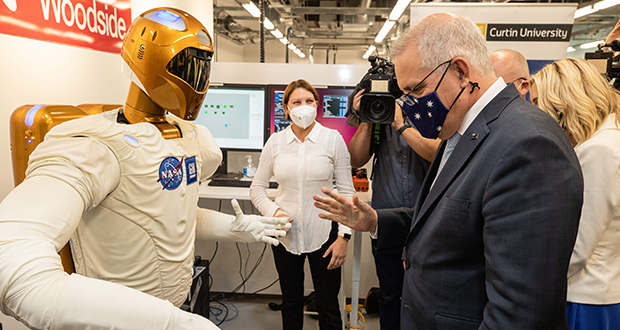How AI and data science is helping aged care when politicians are not: opinion

The Federal Opposition has put the future funding of the nation’s aged care system at the centre of its pitch to voters in the upcoming election.
In his budget reply speech, Anthony Albanese pledged to spend an extra $2.5bn fixing the problems in aged care, on top of funding wage increases for staff, if Labor is elected.
Before its March Budget, the Federal Government announced two extra payments amounting to up to $800 to all aged care staff. Every little bit helps, but aged care workers and the industry need greater support than a one-off stimulus.
More than one year on since the Royal Commission handed down its findings, the most critical reform recommended by the findings has yet to be addressed by Government; fair and increased wages, better training, improved career paths and recognition across the community that aged care workers are some of our most valuable contributors.
The politics of aged care are fraught. Expressions of concern and commitments to do better often go unfulfilled.
But behind the politics of aged care, providers are working hard to care for the aged in the best possible way. For Uniting NSW/ACT, which is one of the country’s largest aged care providers, this has in part meant turning to new technology.
We have undertaken a series of research projects with universities – even a robotics department – in which we are trialling a range of different and innovative programs using advanced analytics and machine learning.
There are projects where hi-tech sensors are helping monitor the wellbeing of people in their homes and even the use of avatars and artificial intelligence to help people improve their balance.
We are using this technology in an effort to keep people in their homes longer.
We are now working with data scientists at the University of Technology Sydney to develop an advanced machine learning system in our Home and Community Care Services, to give us advanced warning of increased risk of critical incidents such as falls or unplanned hospital admissions.
A predictive risk model is being developed using routinely collected home care data that will assist clinicians to identify clients most at risk of hospitalisation or entry to residential aged care. This model will then be refined by using wearable sensors, apps and in-home sensors to collect more detailed and better quality information.
It's all aimed at allowing us to intervene early and help people live safely at home for longer. We know this is what people most want and that it is also the most cost-effective form of aged care.
And although it sounds like a Hollywood movie, we are working with the University of NSW and using avatars and artificial Intelligence through a special app that customises an exercise program for a person to improve their balance and reduce their risk of falls.
The app learns from the movements it captures from each person and can then respond with exercise recommendations that are tailored specifically to that person’s needs.
We are also trying to work smarter at understanding the needs and well-being of residents in aged care in a partnership with Flinders University Caring Future Institute.
This work has involved piloting a new measure of ‘quality of life’ for older people. Some of the early results have shown a high-level of well-being in the areas of independence and pain management.
Scores were slightly lower for relationships with families and friends – no doubt not helped by COVID-inspired lockdowns.
This research has shown that the lowest scores are not influenced by age, or a person’s ailments. What it shows is that residents suffer the greatest shock including psychological stress in the first two years after admission due to the transition from their family home.
This will enable us to invest more time and resources on this journey of entry into aged care residential centres to make life better for our clients.
We hope our learnings will not only benefit and inform the work of Uniting but also, in sharing it, we hope to help other aged care providers. We also hope it can inform more effective future investment in aged care.
Of course, this work is not enough in itself to make a difference if there is not sufficient government funding of the entire aged care system.
We hope this election campaign will see all candidates support moves to finally deliver the resources the aged care system needs.
Of course, nothing can be delivered without a workforce. After decades of underfunding aged care, these heroic staff are some of the lowest paid workers in the country.
The growing demand for workers in aged care, combined with their chronic low rates of pay is fuelling this workforce crisis.
Aged care providers are working hard to work smarter and to deliver better services in aged care but they cannot do it without adequate funding. Even our ability to pilot innovative new programs is dependent on a properly funded sector.
Let us not have another Royal Commission report into aged care languish on a shelf. We must seize all the recommendations and invest in the very people who do the caring of older Australians every day.
Dr Tom McLean is Research and Policy Lead at Uniting NSW and ACT.
Email: [email protected]






Al and data science “are” fixing
Fantastic to read about the work being done in this space. Thanks for sharing Tom.
I reached out to the CEO of an Aged Care facility recently asking if they would participate in a research study about The use of Technology in Aged Care.
Their response was “Thanks but no thanks – unless you have some robot nurses.” A funny response on the face of it however the reality is that technology can already provide real benefit that improves operational efficiency, which is so important when the whole industry is short-staffed. Even better though, it also reduces risk and improves quality of life for clients and staff.
Many in the industry are cautious about technology. And fair enough. However the right technology implemented in the right way will help make individual organisations and the industry as a whole, sustainable in the long-term.
Aged Care workers have STILL not been paid the bonus 2 x $400 payments!!!